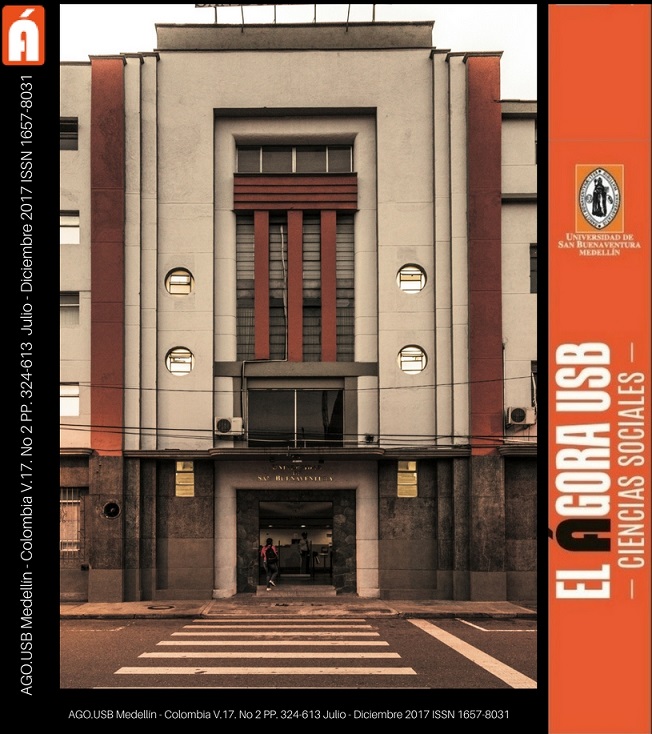View/Download
How to Cite
Acevedo Muriel, A. F., & Murcia Rubiano, Ángela M. (2017). Emotional Intelligence and Fifth-Grade Learners’ Learning Process at a Nationalized State Educational Institution. Ágora USB, 17(2), 545–555. https://doi.org/10.21500/16578031.3290
More Citation Formats
License terms
▼
The authors are also adhere to the creative commons license 4.0 (https://creativecommons.org/licenses/by-nc-nd/4.0/deed.es)
Attribution - NonCommercial - SinDerivar 4.0 International (CC BY - NC - ND 4.0)
Abstract
The fact of determining the relationship between emotional intelligence and fifth-grade learners’ learning process at the Nationalized State Educational Institution at the La Carrera branch in the Municipality of Paime, Cundinamarca, Colombia, allowed to verify and to generate discussion on the relationship between emotional intelligence and fifth-grade learners’ learning. There, it can be noted that the greater the support and the strengthening of emotional intelligence are, both in the school ambiance and in the family and society, the greater the learner’s learning process development is.
Keywords:
References
Alsinet, C. (2000). El bienestar en la infancia. Lleida: Editorial Pagès.
Andrews, F.M., y Withey, S.B. (1976). Social indicators of well-being:America’s perception of life quality. New York: Plenum Press.
Arrindell, W. A., Heesink, J. & Feij, J. A. (1999). The Satisfaction With Life Scale (SWLS): Appraisal with 1700 health Young adults in The Netherlands. Personality and Individual Differences, 26, 815–826.
Gardner, H. (2001). La teoría de las inteligencias múltiples. Bogotá: Fondo de Cultura Económica.
Goleman, D. (2001). Inteligencia Emocional. Barcelona: Kairós.
Goleman, D. (1996). Inteligencia Social. La nueva ciencia de las relaciones humanas: Kairós.
Hernández, H. P. (2005). ¿Puede la inteligencia emocional predecir el rendimiento? Revista interuniversitaria de Formación del profesorado, pp. 45-62. Recuperado de: http://dialnet.unirioja.es/servlet/articulo?codigo=2126753
Kerlinger F.N. (1979).La investigación del comportamiento. Interamericana. México.
Marzano, J. & Pickering, D. (2005). Dimensiones del aprendizaje. Manual para el maestro. Jalisco: Iteso.
Myers, D.G. y Diener, E. (1995). Who is happy? Psychological Science, 6, 10-19.
Newsome, S., DAY, A. L. & Catano, V. M. (200). Assessing the predictive validity of emotional intelligence. Personality and Individual Differences, 29. 1005-1016
Ortiz, A. (2013). Modelos pedagógicos y teorías del aprendizaje. Bogotá: Ediciones de la U.
Rogers, C. (1992). El proceso de convertirse en persona. Barcelona: Paidós.
Salovey, P. y Sluyter, D.J. (Eds.), (1997). Emotional development and emotional intelligence: Educational implications. Nueva York: Basic Books.
Sánchez Cánovas, J. y Sánchez López, M. P. (1994) (Comp.), Psicología diferencial: Diversidad e individualidad humanas (pp. 310-320). Madrid: Centro de Estudios Ramón Areces.
Sánchez López, M. C., Parra Martínez, J. & Prieto Sánchez, M. D. (2005). La dimensión afectiva familiar: variables relevantes para el bienestar psicológico de estudiantes adolescentes. Revista de Investigación Educativa, Vol. 23, Núm. 2.
Vygotsky, L. (2008). El desarrollo de los procesos psicológicos superiores. Barcelona: Crítica.
Andrews, F.M., y Withey, S.B. (1976). Social indicators of well-being:America’s perception of life quality. New York: Plenum Press.
Arrindell, W. A., Heesink, J. & Feij, J. A. (1999). The Satisfaction With Life Scale (SWLS): Appraisal with 1700 health Young adults in The Netherlands. Personality and Individual Differences, 26, 815–826.
Gardner, H. (2001). La teoría de las inteligencias múltiples. Bogotá: Fondo de Cultura Económica.
Goleman, D. (2001). Inteligencia Emocional. Barcelona: Kairós.
Goleman, D. (1996). Inteligencia Social. La nueva ciencia de las relaciones humanas: Kairós.
Hernández, H. P. (2005). ¿Puede la inteligencia emocional predecir el rendimiento? Revista interuniversitaria de Formación del profesorado, pp. 45-62. Recuperado de: http://dialnet.unirioja.es/servlet/articulo?codigo=2126753
Kerlinger F.N. (1979).La investigación del comportamiento. Interamericana. México.
Marzano, J. & Pickering, D. (2005). Dimensiones del aprendizaje. Manual para el maestro. Jalisco: Iteso.
Myers, D.G. y Diener, E. (1995). Who is happy? Psychological Science, 6, 10-19.
Newsome, S., DAY, A. L. & Catano, V. M. (200). Assessing the predictive validity of emotional intelligence. Personality and Individual Differences, 29. 1005-1016
Ortiz, A. (2013). Modelos pedagógicos y teorías del aprendizaje. Bogotá: Ediciones de la U.
Rogers, C. (1992). El proceso de convertirse en persona. Barcelona: Paidós.
Salovey, P. y Sluyter, D.J. (Eds.), (1997). Emotional development and emotional intelligence: Educational implications. Nueva York: Basic Books.
Sánchez Cánovas, J. y Sánchez López, M. P. (1994) (Comp.), Psicología diferencial: Diversidad e individualidad humanas (pp. 310-320). Madrid: Centro de Estudios Ramón Areces.
Sánchez López, M. C., Parra Martínez, J. & Prieto Sánchez, M. D. (2005). La dimensión afectiva familiar: variables relevantes para el bienestar psicológico de estudiantes adolescentes. Revista de Investigación Educativa, Vol. 23, Núm. 2.
Vygotsky, L. (2008). El desarrollo de los procesos psicológicos superiores. Barcelona: Crítica.
Downloads
Download data is not yet available.




















